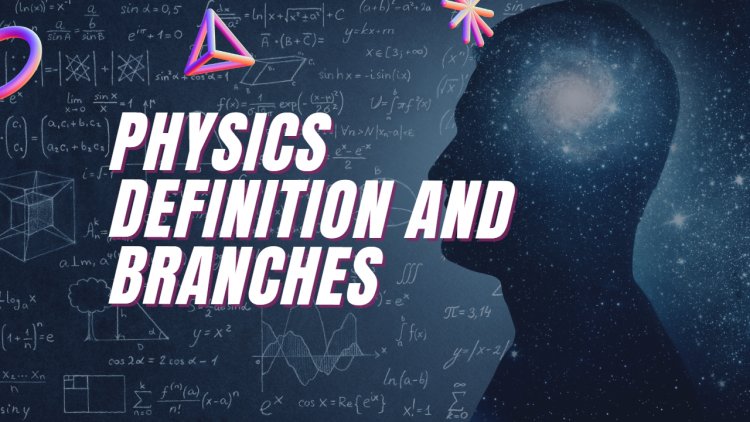physics definition and branches and Famous physicists and their contributions:
Physics is The study of matter and energy, and their relation with each other. Mechanics, Optics, Electronics, Heat are the Main Types of Physics.

Physics Definition and Branches
What is Physics?
Physics is the most fundamental branch of physical science that deals with the study of matter and energy, and their relationship with each other. Simple physics definition is, Physics is basically the study of how objects behave. Physics is an important and basic part of physical science. It is an experimental science. Classical Physics and Modern Physics are two Major Types of Physics.
In This Site, You Are Going To Learn “What is Physics About” From Basics To Advance level.
This Site Includes lots of:
- Physics Branches
- Laws of Physics
- Equations of Physics
- Real-life examples
- Applications and Uses of Physics in Daily life
- Formulas
- Lots more
So If You Want To Get Great Results From this Website, You’ll Love This Site. Let’s Dive Right in.…
Types of Physics
The Main Branches of Physics are:
- Classical Physics
- Quantum Physics or Modern Physics
Classical Physics believes in a single nature, only the particle nature of matter. It provides the macroscopic vision of matter. It is based upon Newton’s laws of mechanics and Maxwell’s laws of electromagnetism. Quantum Physics believes in the dual nature, both particle and wave nature of matter. It provides a microscopic vision of matter. It is based upon Planck’s quantum theory of light and De Broglie’s idea of matter-wave.In the practical field, The common branches of Physics are:
- Mechanics
- Electricity and Magnetism
- Thermodynamics
- Sound and oscillations
- Modern physics
- Optics
- Electronics
- Nuclear physics
- Basic Physics Equations
- Measurements
- Physics important Questions
- Physics Laboratory Apparatus
If you are confused about clicking on which type of topics then visit our site map in which all topics are listed on individual branches of physics. Besides this, you can also use a search bar to find wanted topics.
Famous physicists and their Contributions:
| Name of Physicists | Inventions |
| Isaac Newton | Law of Gravitation, Laws of Motion, Reflecting telescope |
| Galileo Galilei | Law of Inertia |
| Archimedes | Principle of Buoyancy, Principle of Lever |
| S.N.Bose | Quantum Statistics |
| Niels Bohr | Quantum model of the Hydrogen atom |
| James Chadwick | Neutron |
| Earnest Rutherford | Nuclear model of Atom |
| Christian Huygens | Wave theory of Light |
| Edvin Hubble | Expanding Universe |
| Abdus Salam | Unification of week and e/m interactions |
| R.A.Milikan | Measurement of Electronic Charge |
| E.O.Lawrence | Cyclotron |
| Wolfgang Pauli | Quantum Exclusion principle |
| Louis de Broglie | Wave nature of matter |
| J.J.Thomson | Electron |
| Hideki Yukawa | Theory of Nuclear Forces |
| James Clerk Maxwell | Theory of Electromagnetism, Kinetic Theory of Gasses |
| Wilhelm E Weber | Developed sensitive magnetometers, worked in electrodynamics and the electrical structure of matter |
| Joseph Henry | Performed extensive fundamental studies of electromagnetic phenomena, devised first practical electric motor |
| Michael Faraday | Discovered Electromagnetic induction and devised the first electrical transformer |
| Count Alessandro Volta | Pioneer in the study of electricity, invented Battery |
| Andre Marie Ampere | Father of electrodynamics |
| Hans Christian Oersted | Discovered that a current in a wire can produce magnetic effects |
| Georg Ohm | Discovered that current flow is proportional to potential difference and inversely proportional to resistance (Ohms law) |
| Johan Balmer | Developed empirical formula to describe hydrogen spectrum |
| Gustav Kirchhoff | Developed three laws of spectral analysis and three rules of electric circuit analysis, also contributed to optics |
| Heinrich Hertz | Worked on electromagnetic phenomena; also discovered radio waves and the Photoelectric effect |
| Nikola Tesla | Created alternating current |
| Lord Rayleigh | Discovered argon, explained how light scattering is responsible for the red color of sunset and blue color of the sky |
| Antoine Henry Becquerel | Discovered natural radioactivity |
| Sir Joseph John Thomson | Demonstrated existence of the electron |
| Max Planck | Formulated the quantum theory, explain the wavelength distribution of blackbody radiation |
| Pierre Curie | Studied Radioactivity with wife, Marie Curie; discovered piezoelectricity |
| Wilhelm Wien | Discovered laws governing the radiation of heat |
| Marie Curie | Discovered radioactivity of thorium; co-discovered radium and polonium |
| Charles Wilson | Invented the cloud chamber |
| Albert Einstein | Explained Brownian motion and photoelectric effect; theory of atomic spectra, Formulated Theories of special and general relativity |
| Otto Hahn | Discovered the fission of heavy nuclei |
| Clinton Joseph Davison | Co discovered electron diffraction |
| Niels Bohr | Contributed to Quantum theory and theory of nuclear reactions and nuclear fission |
| Arthur Compton | Discovered the increase in wavelength of x rays when scattered by an electron |
| Werner Heisenberg | Contributed to the creation of quantum mechanics; introduced the Uncertainty principle and concept of exchange forces |
| Wilhelm Rontgen | Discovered and studied x rays |
What's Your Reaction?




















